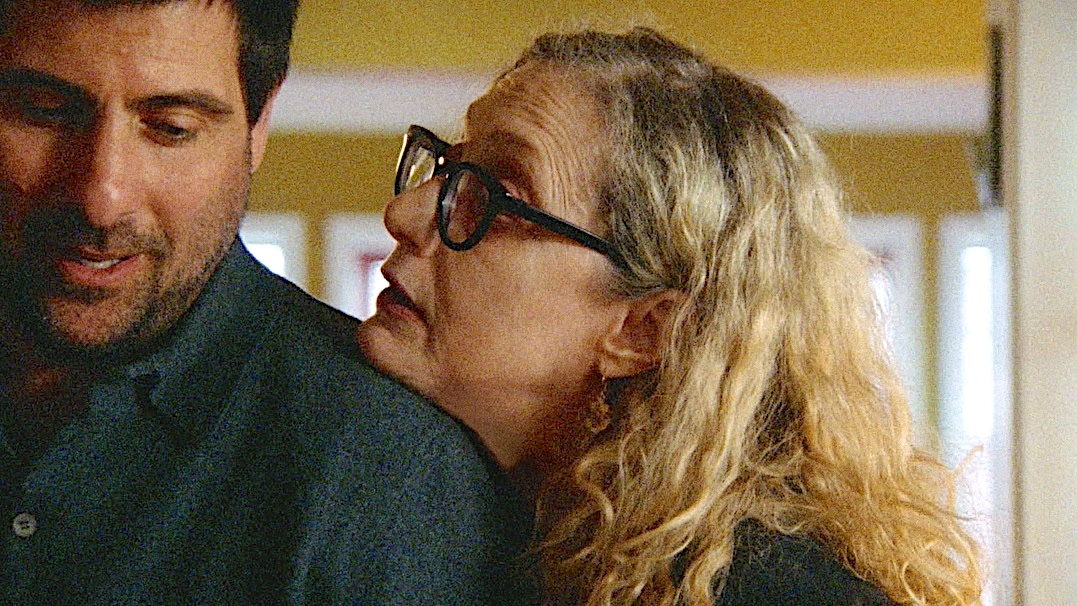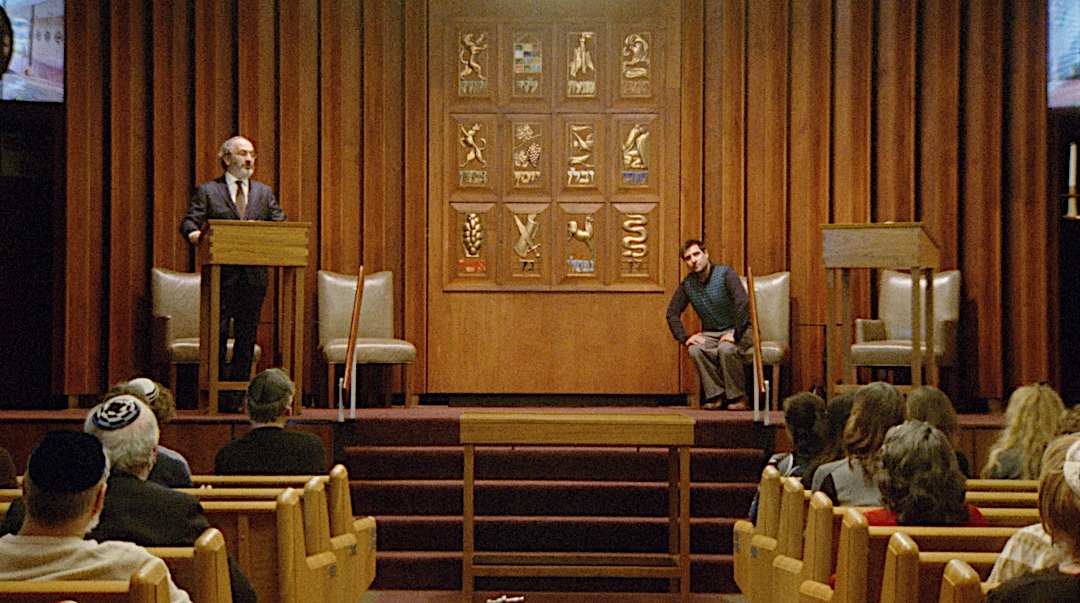The first sound in “Between the Temples” is a piercing blast from a shofar. Several scenes of the new film are set in a synagogue and depict familiar Jewish tableaus including bat mitzvah preparation, the rabbi/cantor relationship, donors who play an outsize role in Jewish life and a nerve-wracking family Shabbat dinner.
In other words, it may be the most Jewish mainstream movie of the year.
“Between the Temples,” which arrives in theaters Friday, tells the story of Cantor Ben Gottlieb (Jason Schwartzman), who works at a Reform synagogue in upstate New York and is grieving the death of his novelist wife a year earlier. Carol Kane stars as Carla, his childhood music teacher, who grew up without Jewish tradition but now wants an adult bat mitzvah.
The duo forms the heart of a warm intergenerational buddy comedy-drama that plays out in an archetypal Jewish setting.
“We’re thinking about two people … at two different crossroads, of this cantor who is having a crisis of faith, and what that would look like, against someone who is seeking to have faith, and seeking to embrace faith, and how they would help each other, and the kind of connection that would result from that,” Nathan Silver, the film’s New York-based director and co-writer, told the Jewish Telegraphic Agency.
“Between the Temples” was shot in part at Silver’s parents’ synagogue in Kingston, New York: Congregation Emanuel of the Hudson Valley (it’s called “Temple Sinai” in the film). Silver (not to be confused with Nate Silver, the political prognosticator) said it was important to him and his colleagues to depict a small-town Jewish community not typically shown in the movies.
“They’re in the middle of nowhere, but they’re a couple of hours away from New York City,” Silver said.
As the film begins, Cantor Gottlieb is suffering both a spiritual and a professional crisis, especially since his grief has robbed him of his ability to sing. Kane’s character is the daughter of secular Communists, while her late husband wasn’t Jewish.
“I grew up in a totally secular household,” Silver said, noting that when his parents moved from suburban Boston to the Hudson Valley, “they wanted to find some kind of community, so they joined a temple.”
The “seed of the movie,” said Silver, was his own mother’s decision to take an adult b’nai mitzvah class. “There’s a movie there!’” he remembers being told by a publicist friend, Adam Kersh. “‘You gotta do like a “Harold and Maude” riff where the late-in-life bat mitzvah [student] falls in love with her cantor or rabbi.’”
Kersh ended up serving as a producer on the film.
Silver said he consulted with a rabbi, Mikey Hess Weber, at the script-writing stage, to make sure the film got its Jewish elements right, while one of the producers, Jesse Miller — himself a bar mitzvah tutor — helped during the production. Silver called Miller “an essential resource on set, and helped everyone with Hebrew and any questions we might have.”
Robert Smigel, who plays Rabbi Bruce in the film, said he also consulted a rabbi — his own — to get the details right. He plays a senior colleague trying to help Ben and set him up with his daughter Gabby (Madeline Weinstein). Although Rabbi Bruce drives a car with the license plate “TKKNOLM,” meaning “Tikkun Olam,” the Hebrew shorthand for social justice, Schwartzman’s character has trouble seeing him as a role model.
“I was was sort of representing what Jason was dissatisfied with in everyday life,” Smigel told JTA of the character. “A rabbi who’s a bit self-absorbed and focused on the mundane aspects of being a rabbi, raising money for the temple, and not necessarily the most inspiring spiritual leader, at least for Jason.”
An observant Jew and comedy stalwart who worked on “Saturday Night Live” and “Late Night with Conan O’Brien,” Smigel is best known as the voice and puppeteer behind Triumph the Insult Comic Dog. He has spoken in interviews over the years about how the Yiddish theater and Jewish insult comedy traditions inspired that character.
Smigel also co-wrote “You Don’t Mess With the Zohan,” the 2008 comedy in which Adam Sandler played an Israeli commando who becomes a New York hairdresser.

Jason Schwartzman plays a cantor and Carol Kane plays an adult bat mitzvah student in Nathan Silver’s film, “Between the Temples.” (Sony Pictures Classics)
Smigel thought the message of “Between the Temples” about Judaism was primarily positive.
“What I love about this movie is that it doesn’t mock religion in any way,” Smigel said. “It doesn’t mock Judaism. It cuts to the essence of Judaism, where a lot of it is questioning, you’re permitted to ask questions, you’re permitted to have doubt. And then, on the other side, it’s about humility and what we’re here for.”
A critical scene in “Between the Temples” comes near the end: a claustrophobic Shabbat dinner scene that includes all of the major characters. It will look familiar to fans of recent Jewish-themed films such as “Uncut Gems” and “Shiva Baby,” where Jewish families collide loudly and angrily on occasions usually set aside for holier pursuits.
“We shot that over the course of two nights with two cameras,” Silver said. Two versions were written and filmed, with different actors arguing for different versions.
“When an actor is fighting for their character, you can’t deny that, there’s like a passion there, so we embraced that,” he said. “This tension, this aspect of what this sequence looked like in the finished film, this added to the chaos of the actual sequence.” Ultimately, the two versions, plus a third sequence, were combined for the finished scene.
Schwartzman is Jewish on his father’s side — his mother is Talia Shire, part of the Italian-American Coppola family of great showbiz fame — and he’s played Jewish characters throughout his career, and more than his share of grieving husbands.
“I’m proud to be Jewish, but, yeah, I just consider myself everything. I’m just lucky to be here,” Schwartzman said in an interview in 2009 with Heeb Magazine.
In the film’s press notes, Schwartzman — a musician who used to play with the band Phantom Planet — shares that he learned how to play and sing all of the Jewish music featured.
“I wanted to understand the structure and theory behind these songs and how they were arranged,” the actor said in the notes. “It was for my own pleasure but also so that I could understand the songs and absorb them and have them be part of the character. It was so fun to figure out how to play the songs, to find the little nuances and melody, and to hear different versions of how they’re sung. I really fell in love with the music.”
The film is also a comeback for Kane, 72, the Jewish actress who starred in seminal Jewish classics such as Joan Micklin Silver’s “Hester Street” and Woody Allen’s “Annie Hall” in the 1970s.
“Carla’s wanted this all her life, and she decides to go for it, even though it’s very problematic because her only child, her son, thinks it’s a joke,” Kane said of her character’s late-life spiritual turn, in the film’s press notes. “So, she has to deal with the fact that he doesn’t believe in it and still powers through, which is so brave and so hard.”
While it premiered at Sundance in January, “Between the Temples” also appeared on the Jewish film festival circuit, including as a centerpiece in July at the San Francisco Jewish Film Festival.
“It was delightful to have it with this Jewish audience,” Silver said.
JTA has documented Jewish history in real-time for over a century. Keep our journalism strong by joining us in supporting independent, award-winning reporting.






